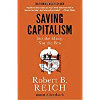
In the 1980s, corporate CEOs were paid, on average, 30 times what their typical worker was paid. Since then, CEO pay has skyrocketed to 280 times the pay of a typical worker; in big companies, to 354 times.
Meanwhile, over the same thirty-year time span the median American worker has seen no pay increase at all, adjusted for inflation. Even though the pay of male workers continues to outpace that of females, the typical male worker between the ages of 25 and 44 peaked in 1973 and has been dropping ever since. Since 2000, wages of the median male worker across all age brackets has dropped 10 percent, after inflation.
Excess CEO Pay Is Bad For The Economy
This growing divergence between CEO pay and that of the typical American worker isn’t just wildly unfair. It’s also bad for the economy. It means most workers these days lack the purchasing power to buy what the economy is capable of producing — contributing to the slowest recovery on record. Meanwhile, CEOs and other top executives use their fortunes to fuel speculative booms followed by busts.
Anyone who believes CEOs deserve this astronomical pay hasn’t been paying attention. The entire stock market has risen to record highs. Most CEOs have done little more than ride the wave.
There’s no easy answer for reversing this trend, but this week I’ll be testifying in favor of a bill introduced in the California legislature that at least creates the right incentives. Other states would do well to take a close look.
Corporations With Low Pay Ratios Get A Tax Break
The proposed legislation, SB 1372, sets corporate taxes according to the ratio of CEO pay to the pay of the company’s typical worker. Corporations with low pay ratios get a tax break.Those with high ratios get a tax increase.
For example, if the CEO makes 100 times the median worker in the company, the company’s tax rate drops from the current 8.8 percent down to 8 percent. If the CEO makes 25 times the pay of the typical worker, the tax rate goes down to 7 percent.
On the other hand, corporations with big disparities face higher taxes. If the CEO makes 200 times the typical employee, the tax rate goes to 9.5 percent; 400 times, to 13 percent.
The California Chamber of Commerce has dubbed this bill a “job killer,” but the reality is the opposite. CEOs don’t create jobs.Their customers create jobs by buying more of what their companies have to sell — giving the companies cause to expand and hire.
So pushing companies to put less money into the hands of their CEOs and more into the hands of average employees creates more buying power among people who will buy, and therefore more jobs.
The other argument against the bill is it’s too complicated. Wrong again. The Dodd-Frank Act already requires companies to publish the ratios of CEO pay to the pay of the company’s median worker (the Securities and Exchange Commission is now weighing a proposal to implement this). So the California bill doesn’t require companies to do anything more than they’ll have to do under federal law. And the tax brackets in the bill are wide enough to make the computation easy.
CEO’s Gaming The System
What about CEO’s gaming the system? Can’t they simply eliminate low-paying jobs by subcontracting them to another company – thereby avoiding large pay disparities while keeping their own compensation in the stratosphere?
No. The proposed law controls for that. Corporations that begin subcontracting more of their low-paying jobs will have to pay a higher tax.
For the last thirty years, almost all the incentives operating on companies have been to lower the pay of their workers while increasing the pay of their CEOs and other top executives. It’s about time some incentives were applied in the other direction.
The law isn’t perfect, but it’s a start. That the largest state in America is seriously considering it tells you something about how top heavy American business has become, and why it’s time to do something serious about it.
About the Author
 ROBERT B. REICH, Chancellor’s Professor of Public Policy at the University of California at Berkeley, was Secretary of Labor in the Clinton administration. Time Magazine named him one of the ten most effective cabinet secretaries of the last century. He has written thirteen books, including the best sellers “Aftershock" and “The Work of Nations." His latest, "Beyond Outrage," is now out in paperback. He is also a founding editor of the American Prospect magazine and chairman of Common Cause.
ROBERT B. REICH, Chancellor’s Professor of Public Policy at the University of California at Berkeley, was Secretary of Labor in the Clinton administration. Time Magazine named him one of the ten most effective cabinet secretaries of the last century. He has written thirteen books, including the best sellers “Aftershock" and “The Work of Nations." His latest, "Beyond Outrage," is now out in paperback. He is also a founding editor of the American Prospect magazine and chairman of Common Cause.
Books by Robert Reich
Saving Capitalism: For the Many, Not the Few -- by Robert B. Reich
 America was once celebrated for and defined by its large and prosperous middle class. Now, this middle class is shrinking, a new oligarchy is rising, and the country faces its greatest wealth disparity in eighty years. Why is the economic system that made America strong suddenly failing us, and how can it be fixed?
America was once celebrated for and defined by its large and prosperous middle class. Now, this middle class is shrinking, a new oligarchy is rising, and the country faces its greatest wealth disparity in eighty years. Why is the economic system that made America strong suddenly failing us, and how can it be fixed?
Click here for more info or to order this book on Amazon.
Beyond Outrage: What has gone wrong with our economy and our democracy, and how to fix it -- by Robert B. Reich
 In this timely book, Robert B. Reich argues that nothing good happens in Washington unless citizens are energized and organized to make sure Washington acts in the public good. The first step is to see the big picture. Beyond Outrage connects the dots, showing why the increasing share of income and wealth going to the top has hobbled jobs and growth for everyone else, undermining our democracy; caused Americans to become increasingly cynical about public life; and turned many Americans against one another. He also explains why the proposals of the “regressive right” are dead wrong and provides a clear roadmap of what must be done instead. Here’s a plan for action for everyone who cares about the future of America.
In this timely book, Robert B. Reich argues that nothing good happens in Washington unless citizens are energized and organized to make sure Washington acts in the public good. The first step is to see the big picture. Beyond Outrage connects the dots, showing why the increasing share of income and wealth going to the top has hobbled jobs and growth for everyone else, undermining our democracy; caused Americans to become increasingly cynical about public life; and turned many Americans against one another. He also explains why the proposals of the “regressive right” are dead wrong and provides a clear roadmap of what must be done instead. Here’s a plan for action for everyone who cares about the future of America.
Click here for more info or to order this book on Amazon.





























